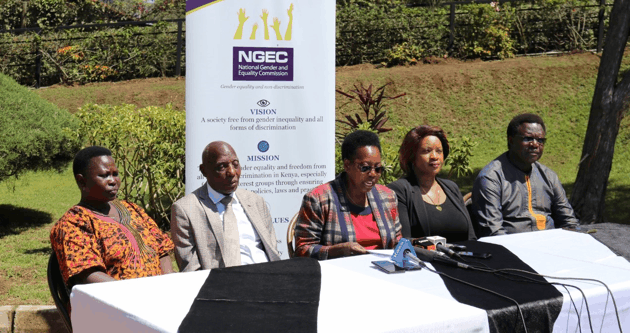NGEC urges political parties to comply with Two-Thirds Gender Principle
STATEMENT BY THE NATIONAL GENDER AND EQUALITY COMMISSION ON PROMOTING MEANINGFUL AND GREATER PARTICIPATION OF SPECIAL INTEREST GROUPS (SIGS) IN THE POLITICAL PARTY PROCESSES IN READINESS FOR THE 2022 GENERAL ELECTIONS, FRIDAY MAY 6 2022
We have called you here today to pronounce ourselves on the matter of electoral preparedness and to advise election actors and stakeholders to ensure that the electoral process is inclusive by complying with the principles of equality and inclusion ahead of the August 9, 2022 General Elections.
As you may recall, a week ago, the Independent Electoral and Boundaries Commission (IEBC) directed all Political Parties participating in the upcoming General Election to adhere to the two-thirds gender rule in all the required elective posts. This was in accordance with the judgment delivered in the Constitutional Petition No. 19 of 2017 in Katiba Institute vs IEBC. Gender parity in political representation is a constitutional requirement under Article 27(8) of the Constitution of Kenya,2010, which provides that no one gender, should occupy more than two-thirds of appointive and elective bodies.
We note that the IEBC has reiterated this directive and urged Political Parties that are yet to adhere to the two-thirds gender rule to do so on or before Monday, May 9, 2022.
Section 2 of the Political Parties (Amendment) Act 2016 defines women, youth, persons with disabilities (PWD), ethnic minorities and marginalised communities as special interest groups (SIG). Article 260 of the Constitution, of Kenya, 2010 defines a marginalised group as a group of people who, because of laws or practices before, on or after the effective date, were or are disadvantaged by discrimination on one or more of the grounds outlined in Article 27(4). These grounds include race, sex, pregnancy, marital status, health status, ethnic or social origin, colour, age, disability, religion, conscience, belief, culture, dress, language or birth.
Special Interest Groups in Kenya have not enjoyed and exercised their political rights equitably even though they constitute the majority of the population. Since the promulgation of the Constitution of Kenya in 2010, a lot of effort has been directed at putting in place a legislative mechanism to ensure not more than two-thirds of same-gender comprise Parliament and County Assemblies. To date, Parliament has failed to enact legislation to promote SIG representation, particularly the youth and PWD, in Parliament as envisaged in Article 100 of the Constitution.
To guarantee the full participation and inclusion of special interests groups in political processes, it is instructive that the constitutional imperatives for guaranteeing equality and inclusion are backed by sound legislation, administrative rules, regulations and guidelines.
The National Gender and Equality Commission is mandated to promote gender equality and freedom from discrimination. Over time, the Commission has taken various measures aimed at promoting political of Special Interest Groups, including auditing lists of political parties’ nominees submitted to contest in General and By-elections, participating as a friend of the court to secure SIGs equitable representations in Parliament and County Assemblies, among others.
The electioneering process does not start during voting. It starts from the time of voter education, voter registration, political party primaries, and campaigns and during the day of actual voting. It is our submission that for an inclusive electoral process, it must start right. The Commission therefore advises political parties to:-
- Commit to complete nominations in good time to allow for dispute resolution mechanisms at the party level as provided by the law.
- Ensure that the venue and the materials are friendly to persons with disabilities and the elderly especially those who are illiterate and lactating mothers.
- Consider setting aside a proportion of nominations for all elective positions to women candidates in every county. We ask women, youth , minorities and marginalized and persons with disability to present their candidature for competitive elections.
- Prevail upon their respective leaders to pledge their unequivocal support towards the realization of the not more than two-thirds gender principle in political representation in both elective and appointive positions.
- Allow and encourage special interest groups to register and participate in electoral processes including vying for various elective positions.
- Ensure campaigns are conducted in a civilized and secure environment for all including liaising with law enforcement arms to provide maximum security to women and persons with disabilities who invariably suffer the blunt of electoral violence.
Credible leaders are as good as the integrity of the electoral process that produces them. Section 72 of the Elections Act specifically on election offences by candidates and Political parties prohibits an individual or a political party from participating and abetting actions of bribery and violence.
We urge the Independent Electoral and Boundaries Commission (IEBC) to be on the lookout for all election malpractices and deal firmly with the individuals concerned. This will serve as a good lesson in future for aspirants to work with supporters and shun violence.
SIGNED
DR. JOYCE M. MUTINDA PhD, EBS
CHAIRPERSON


Comments